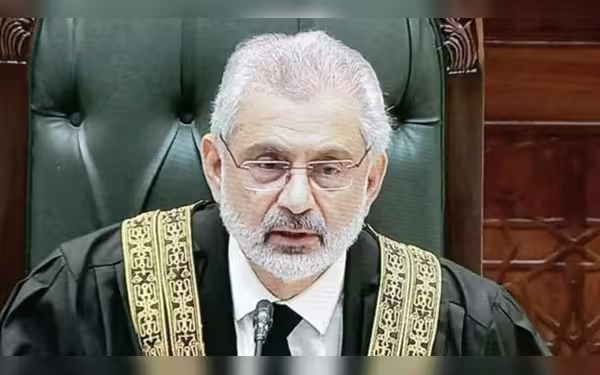Saturday, November 16, 2024 10:25 PM
CJP Asserts Executive and Courts Must Follow SC Orders
- CJP emphasizes adherence to Supreme Court directives.
- Contempt notice withdrawn; stay order criticized.
- Illegal housing society linked to powerful individual revealed.
 Image Credits: brecorder
Image Credits: brecorderCJP Qazi Faez Isa stresses the need for the executive and courts to comply with Supreme Court orders during a session on Margallah Hills activities.
In a significant development regarding the enforcement of judicial orders in Pakistan, Chief Justice Qazi Faez Isa has emphasized that both the executive branch and all courts are obligated to adhere to the directives issued by the Supreme Court. This statement was made during a session of a three-judge bench that was convened to address an application concerning the removal of commercial activities from the Margallah Hills area.
The bench, while deliberating on the matter, decided to withdraw a contempt notice against Luqman Ali Afzal related to the demolition of the Monal Restaurant. However, it issued a notice concerning Dino Valley, as the advocate general of Khyber-Pakhtunkhwa (KP) revealed that the amusement park is owned by Ali Afzal. Chief Justice Isa pointed out that, according to the Constitution, it is mandatory for the executive and all courts to implement the Supreme Court’s decisions.
During the proceedings, the Chief Justice expressed concern over a stay order granted by a civil court in Islamabad, which appeared to undermine the Supreme Court’s authority. He noted that the Supreme Court had previously ordered the Islamabad Wildlife Management Board to take possession of the restaurants located within the Margallah Hills National Park by September 11, 2024. However, a Civil Judge, Inamullah, issued a stay on September 24, preventing any action against the Monal Restaurant.
The bench has now referred the matter of this stay order to the Islamabad High Court (IHC), instructing it to review the situation and take appropriate action against the civil judge if necessary. Chief Justice Isa criticized the civil judge’s decision, labeling it as “ridiculous” and an act of contempt of court.
Ahsan Bhoon, the lawyer representing Monal Restaurant, informed the court that the restaurant had already been demolished by the authorities. He mentioned that they had requested the Capital Development Authority (CDA) to repurpose the structure for other uses. However, he also noted that a suit for stay had been withdrawn on October 2.
Justice Shahid Bilal raised questions about the procedural integrity of the civil court, pointing out that the judge did not verify whether the plaintiff had paid the required court fee before granting the stay. He remarked on the troubling trend in Punjab, where lawyers often rush cases through the subordinate judiciary without allowing judges sufficient time to review the plaints.
Chief Justice Isa further questioned whether the issue of commercial activities in the Margallah Hills had been addressed in Parliament or discussed in the media. He expressed frustration over the public’s tendency to direct criticism at the Supreme Court, stating that while it is acceptable to critique a court’s decision, personal attacks on judges and the institution are unwarranted.
In a related discussion, Ahsan Bhoon referred to the Supreme Court’s verdict on Article 63A of the Constitution, highlighting delays in hearing review petitions. Umer Gilani, representing the Islamabad Wildlife Management Board, brought to light the existence of an illegal housing society within the Margallah Hills National Park, allegedly linked to a powerful individual. Upon inquiry, it was revealed that the owner is Lt-General (retired) Faiz Hameed.
The court has now issued notices to the CDA and the Chief Commissioner of Islamabad, directing them to submit a report on the matter. This situation underscores the ongoing challenges faced by the judiciary in enforcing its orders and the need for accountability within the system.
As this case unfolds, it serves as a reminder of the delicate balance between judicial authority and executive power in Pakistan. The public’s awareness and engagement in such matters are crucial, as they reflect the broader implications for governance and the rule of law in the country.













